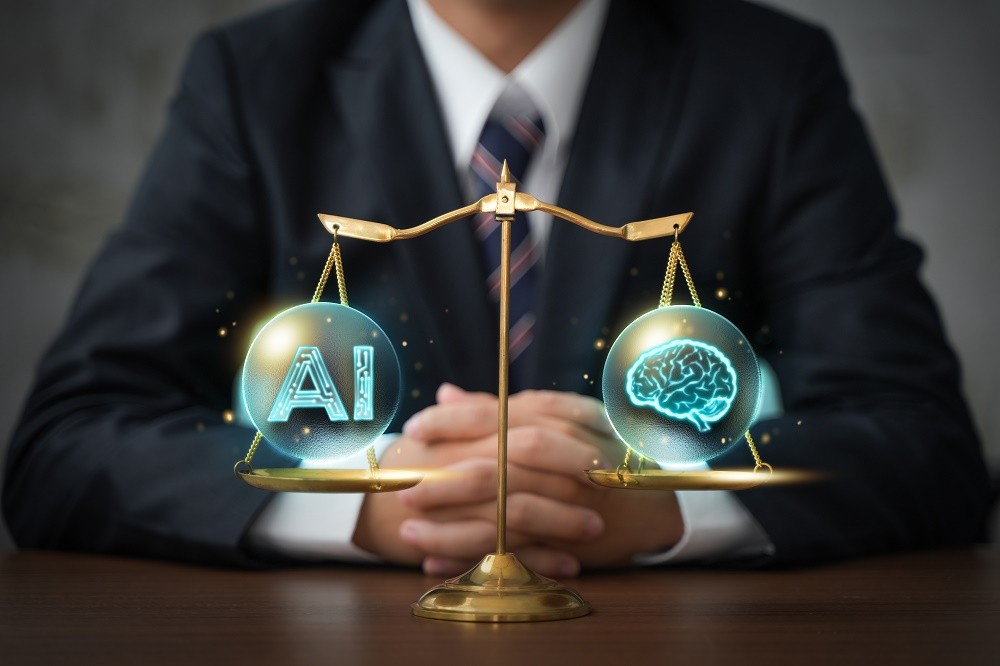ARITIFICIAL INTELIGENCE (AI) IN LEGAL PROFESSION
INTRODUCTION
AI is currently upsetting almost every industry and profession. However, automated contract evaluation, legal research, transcribing services, etc. are currently the only uses of AI in the Indian legal industry. Our goal is to create intelligent, self-governing systems. It can be characterized as an intelligent machine with the capacity to mimic some human behaviors in addition to thinking, understanding, and acting on its own. Therefore, artificial intelligence refers to a system that possesses the capacity and ability to resolve issues that people would typically resolve through the application of our inherent intelligence.
To put it another way, the need for automation in this fast-paced human existence is what is driving the development of artificial intelligence. Even complicated and tedious jobs are now completed with the use of artificial intelligence (AI) technology.

EFFECTS OF AI
There are judicial delays in the Indian court system, as is evident. There are more than 5 Cr[1]. cases waiting in the judiciary, which is overwhelming and unnecessarily delaying the delivery of justice to the public. As they say, justice delayed is justice denied. As a result, numerous initiatives are being made to enhance the current state of affairs, such as shortening the length of vacation time and strengthening the judging panel.
Many identical cases are filed each year, which makes it necessary to use data science and artificial intelligence (AI) to support courts. Predictive technology is used to provide vital information about existing cases based on similar past cases. Studies show that AI can be highly helpful at the evidence stage, which is always a crucial time. It takes up a large amount of court time because it is such a crucial phase in any case. AI-assisted analysis can help judges reach rulings more quickly.
The former Ex-Chief Justice of India, S.A. Bobde, recently said in an interview that “we have a possibility of developing Artificial Intelligence for the court system,” which is one of the most significant recent advancements. only to make sure that there is no unjustified delay in the administration of justice. Additionally, he stated unequivocally that judges or human discretion will not be replaced by AI. “It is only the repetitive, mathematical, and mechanical parts of the judgments for which help can be taken from the machine learning system…we are exploring the possibility of implementing it[2],” he continued, providing additional insights.
RECENT GROWTH OF AI IN INDIA
Vidhik Anuvaad Software of the Supreme Court (SUVAS)[3]
An official AI-driven application developed specifically with machine-assisted translation technology educated by artificial intelligence has been released by the Supreme Court of India. This app’s main purpose is to translate English court orders and legal papers into nine colloquial languages. This is the first action our judiciary has taken to integrate AI into the legal system.
Multilingual Official Supreme Court of India Mobile App[4]
With the help of the National Informatics Centre, our nation’s highest court has developed an app that will enable citizens to authentically access cases, daily orders, judgments, significant circulars, display boards, and a plethora of other crucial information with just a single click.
E-Court
One of the most significant advancements brought about by the judicial reforms is the e-court system[5]. Users may now access crucial information on court orders and judgments online for free, which has saved a great deal of time, energy, and money.
An AI system designed by IIT Kharagpur can read court orders[6]
IIT Kharagpur researchers have built an artificial intelligence (AI) system that can understand court orders and judgments. It also uses machine learning to identify rules that are being broken and flag them.
Can AI replace the Lawyer
Instead of taking the position of lawyers, artificial intelligence is employed to lighten their workload and make their jobs easier. Many legal professionals and firms have a common misconception that artificial intelligence (AI) will replace lawyers. However, this is not feasible because, while machine learning tools can help with research, contract review, and anticipating certain aspects with desired data, they cannot replace tasks like providing clients with advice, negotiating terms, and arguing in court. All these crucial activities will always be carried out by lawyers, and no machine can replace them. As correctly stated by our Chief Justice; AI is there to aid lawyers and judges inthe speedy delivery of justice and can never replace them[7].
In actuality, AI has made lawyers more productive and efficient by lightening their workload so they may concentrate on other crucial areas. The idea that technology is eliminating jobs is debunked; rather, it is presenting us with new opportunities. The rise of AI will lead to additional career prospects in data analytics.
CHALLENGE OF AI
NOT ENTIRELY EMBRACED BY LEGAL EXPERTS
Artificial intelligence in the legal field is still in its infancy when we look at India. Because they think this technology will negatively affect employment, lawyers are reluctant to adopt it. They worry that as a result of technology replacing the main source of income for solicitors and legal clerks, unemployment would rise nationwide. The majority of seasoned legal practitioners prefer to continue practicing in the old-fashioned way, devoid of artificial intelligence and are reluctant to alter their habits.
AI’S LEGAL POSSIBILITY IS UNDEFINED
Because of the complexity of robots and the lack of clear definitions of artificial intelligence’s legal personality elsewhere in modern law, it is impossible to say whether or not standard rules and norms would apply to them. Therefore, there will be misunderstandings until the rights and obligations of AI-driven tools and gadgets are made clear, as the current legal system does not hold a robot accountable for its deeds or inactions.
LACK OF APPROPRIATE SYSTEMS AND DATA
The foundation of machine learning is the feeding of algorithms into computer systems, which the machine then processes. One of the main obstacles to the adoption of AI technology in India is the usage of antiquated machinery and technology[8], frequently inadequate data, and machines that cannot function effectively without a substantial amount of dependable data.
EXPENSIVE
AI machines require a substantial financial investment because they are complex machine systems that can learn and react on their own. Since most AI-driven equipment is produced by foreign companies, small and midsized legal businesses find it even harder to acquire these tools; only larger firms can afford them.
PRIVACY AND PERSONAL DATA PROTECTION
AI-powered machine learning robots must be constructed with the parties’ personal data protection and safety in mind. Because machine learning uses vast volumes of data, it is even more important that the legal framework makes sure that the information is not exploited, that confidentiality is preserved, that due process is applied fairly and that a security layer is put in place to prevent privacy violations.
A policy document titled “National Strategy for Artificial Intelligence,” published by the NITI Ayog in 2018, examined the significance of AI and its potential applications across India’s industries. A national AI program was also suggested to be started in the 2019 Budget (see here). India still lacks strong laws that govern and supervise the AI sector, despite all of these technological advances.
CONCLUSION& SUGGESTION
Conclusion
The legal industry’s perspective has undoubtedly changed as a result of technological advancements. It can be concluded that artificial intelligence (AI) in the legal field offers many advantages: legal professionals can now conduct quick research thanks to AI; judges can benefit from AI’s predictive technology when making decisions; law firms can use AI for data collection, due diligence, and other tasks that increase productivity.Though AI is neither as creative nor as strategic as humans are, it can help people in some aspects of their jobs. Emotional intelligence, empathy, and the capacity to improvise in front of a judge are all absent from robots.
Suggestion
We need to take a fair and balanced approach to ensure that AI is included. A few recommendations are as follows: 1) A robust regulatory framework that outlines the responsibilities and liabilities of this intelligent machine must be drafted; 2) The accountability factor must be taken into consideration to control its actions. 3) To safeguard privacy, more robust data protection regulations are required. Therefore, the answer is not to ignore or shy away from technological breakthroughs but rather to embrace them and use AI to our advantage by putting the necessary laws in place to protect its users’ interests.
Written by Yatri Trivedi 4th year law student at Marwari University
References:
[1]https://prsindia.org/policy/vital-stats/pendency-and-vacancies-in-the-judiciary
[2]Scope of Artificial Intelligence in Law – Legal Desire Media and Insights
[3]Supreme Court Vidhik Anuvaad Software (SUVAS) (drishtijudiciary.com)
[4]The SC will use AI to translate documents, orders, and judgments into regional languages (businessinsider.in)
[5]E-courts services available at, https://services.ecourts.gov.in/ecourtindia_v6/ (last visited on Jan 30, 2024)
[6]IIT Kharagpur’s researchers develop AI method for reading legal case judgments – India Today
[7]Supreme Court Guidelines for Court functioning through videoconferencing during Covid-19 Pandemichttps://main.sci.gov.in/supremecourt/2020/10853/10853_2020_0_1_21588_Judgement_06- Apr- 2020.pdf (last visited on Jan, 30 2024)
[8]Scope of Artificial Intelligence in Law – Legal Desire Media and Insights







